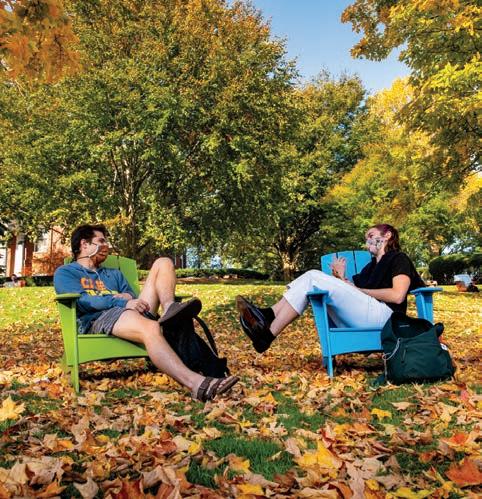
5 minute read
LIVING
LIVING FINDING COMMUNITY ON CAMPUS

Advertisement



Starting college can be exciting and a bit scary, especially when you don’t know other people! When you come to Tufts we hope that you’ll nd community, acceptance, and a version of home on campus. We asked students how they found community, and this is what they had to say.
“As a part of the living-learning community model at Tufts, I’ve had the opportunity to create connections with students across all interests, backgrounds, and identities. I’ve found a network of support and community from my hallmates and have felt empowered by the residential life program to make Tufts truly feel like home.” —Josh Cohen ’24 “My hall (Carmichael) has been great for fostering community... or, as we call it, the CARMmunity. I have loved cultivating meaningful connections with my friends and classmates. They are always there when I need them most, and I can’t imagine a better group of people to begin my college experience with!” —Blake Anderson ’24 “I think the most important thing to remember about trying to nd a community your rst year is that every other rst-year is trying to do the exact same thing. Everyone wants to meet a new person, hear about your hometown, talk about what you’re studying, and then potentially see you later in the dining hall or a class and be able to say hello. The rst few months of your rst year are a lot like friendship speed dating, until you nd a few people who just get you.” —Susannah Murray ’24 “At Tufts, I’ve found my community through all of the common spaces we have on campus––whether those be the common rooms in my residence hall, the Campus Center, or Hotung Café, I’ve met incredible people with whom I learn and grow!” —Marie Kazibwe ’24

HELEN MARROW
ASSOCIATE PROFESSOR OF SOCIOLOGY
Inside her eclectic of ce, decorated with posters of international destinations and over owing with books, sociology professor Helen B. Marrow and I sit face to face, several feet apart and entranced in a discussion. Thought-provoking and expansive conversations are commonplace to have at Tufts, but Professor Marrow’s openness and infectious passion for her eld of study set a new standard. With a worldly outlook and deep regard, Professor Marrow does research on Latin American migration streams to the United States, new immigrant destinations, questions of race and ethnicity amongst Brazilian immigrants, and other migration-related topics. In her study on new immigrant destinations, Professor Marrow explores how migration into rural destinations by “Hispanic and Latino newcomers” impacts both the immigrants and the receiving communities. As the years progress, she must shift with the vitality of her eld, focusing on both the persistent continuities of migration patterns and the malleability of the immigrant experience due to changes in policy and race relations. Regarding the Latinx community, Professor Marrow often discusses with her colleague, Professor Zavala, about the undermining of Latino history in the United States. “[Latino history] is this window to this really big part of our country that we should know better,” she states. “People don’t understand how diverse the community is: the Mexican experience is different from what it’s like to be Venezuelan or Cuban American. I enjoy learning about these communities, and I’m always learning more.”
Being an outsider to the Latino community, Professor Marrow retraces the steps that led her to her career and commences with her passion for languages—namely Spanish and Portuguese. While at Princeton University, Professor Marrow took several language courses and studied abroad. This immersion into Latin American culture would catalyze her future research and interests. “I was going through this period of education and youth and learning about the world,” Professor Marrow recounts when discussing her studies abroad. “Through languages and my travels around the hemisphere, I became interested in migration and learning about how life is similar and different in new places.”
Aside from languages, Professor Marrow emphasizes the courses she took with her long-standing mentor, Professor Patricia Fernández-Kelly, who she credits with igniting a “spark” within her. This “spark”—brimming with intellectual curiosity—is something that she fosters in her Introduction to Sociology class and her Qualitative Research Methods course. “I love watching the light come on for some of my students and seeing it click [within them] because I remember what it was like to enter into Professor Fernández-Kelly’s class and have that spark for myself,” Professor Marrow says. Passing on her expertise in her Qualitative Research Methods course, Professor Marrow does methods training and aids her students in the culmination of their independent projects. Students do literature reviews, collect data, analyze research, and deeply explore the questions they craft. “We have this really supportive, constructively critical environment that helps people realize their abilities,” Professor Marrow explains. “I love teaching this course because you get to know someone and be there with them every step of the way.”
After I’ve run out of questions to ask for my interview, I put down my phone and ask Professor Marrow for more insight into her enthralling research—she gladly welcomes a segue into a tangent that extends our meeting by nearly an hour. I share my own experience as a Nicaraguan immigrant while she provides historical and sociopolitical explanations to many of the concepts I’ve heard of or lived through but never thoroughly examined myself. Between entering and leaving her of ce, I consider altering my academic plans and develop one major impression: Professor Helen Marrow is not only excellent at enriching perspectives—she genuinely cares about her students and the communities that are the subjects of her research. —VALERIA VELASQUEZ ’23






